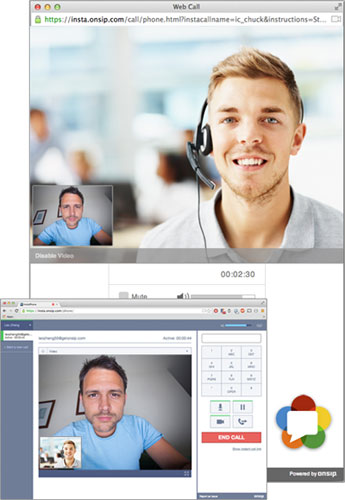
Amazon’s Mayday button has intrigued CRM industry users as well as consumers. Introduced about a year ago, Mayday is a button customers can press on their mobile devices to get service or tech help.
Salesforce.com last month debuted its version of Mayday. Now other tech providers are introducing variations on the theme.
One such company is OnSIP, which has just debuted InstaCall.

It is a Web Real-Time Communications, or WebRTC, application that allows a company to add a button for service or sales assistance to a website or mobile device via the browser.
Google launched WebRTC as an open source project; it supports audio, video and data transfer applications in the browser.
Outsourcing a Phone’s Smarts
OnSIP introduced InstaCall along with its OnSIP Network, a signaling Platform as a Service for developers to build WebRTC applications.
The company’s offerings are aimed at small to medium-sized businesses that want to avoid the acquisition and ongoing maintenance expense of a corporate phone service, Rob Wolpov, OnSIP’s cofounder, told CRM Buyer.
“Customers can outsource the smarts of a traditional phone system — the extension dialing, the routing, etc. — to us and use the service anywhere,” he said.
InstaCall operates on that premise, continued Wolpov.
“The service calls and requests don’t go over traditional phone lines but occur within the sessions of the browser,” he explained.
Coding InstaCall
InstaCall can support both audio and video calls. For the latter, it can be integrated with OnSIP’s InstaPhone, a video-enabled, browser phone application. OnSIP InstaCall also can integrate with Google Analytics for its call-tracking and marketing intelligence abilities.
Even without such bells and whistles, there is some development work involved with InstaCall, but it is point-and-click coding that doesn’t require special training, Wolpov said.
A standard deployment for the button consists of answering such questions as whether the button should collect the user’s name, whether it should be green, and so on.
Configuration options let the user decide how the calls should be routed, Wolpov said. A call coming in from an 800-number for sales, for example, could be routed to the sales team. A call coming in from a customer with a full shopping cart could be routed to service, based on the premise that the shopper needed a question answered before completing the purchase.
The application can give the rep a view into the online cart if the system is thus configured.
“Because we are keeping the phone call within the browser, the rep also has a complete view of the Web visitor session,” Wolpov said.
When all the selections have been made, the user hits a button on the application and gets the code for the customized help button, he noted. “That then gets pasted right into the website.”
Use Cases
These buttons appear to be gaining favor in a service setting, but Wolpov said they originally were conceived with a broader use in mind.
“We think of it as a sales tool — especially when you add a video component,” he said.
For example, a prospective buyer could try on clothes and then ask a trained sales rep about fit or measurements. Or, someone engaged in a Do It Yourself home improvement project could request video support for help in deciding which tool would be right for a particular job.
Instacall also has a role in telemedicine, Wolpov continued, such as assessing the severity of injuries in a field deployment to help get the patient to the right medical facility as quickly as possible.
As for OnSIP, it has been using InstaCall in beta, along with several other companies.
“We have found it immensely useful,” said Wolpov, “and our beta customers love being able to receive contextual information along with the call.”






















































